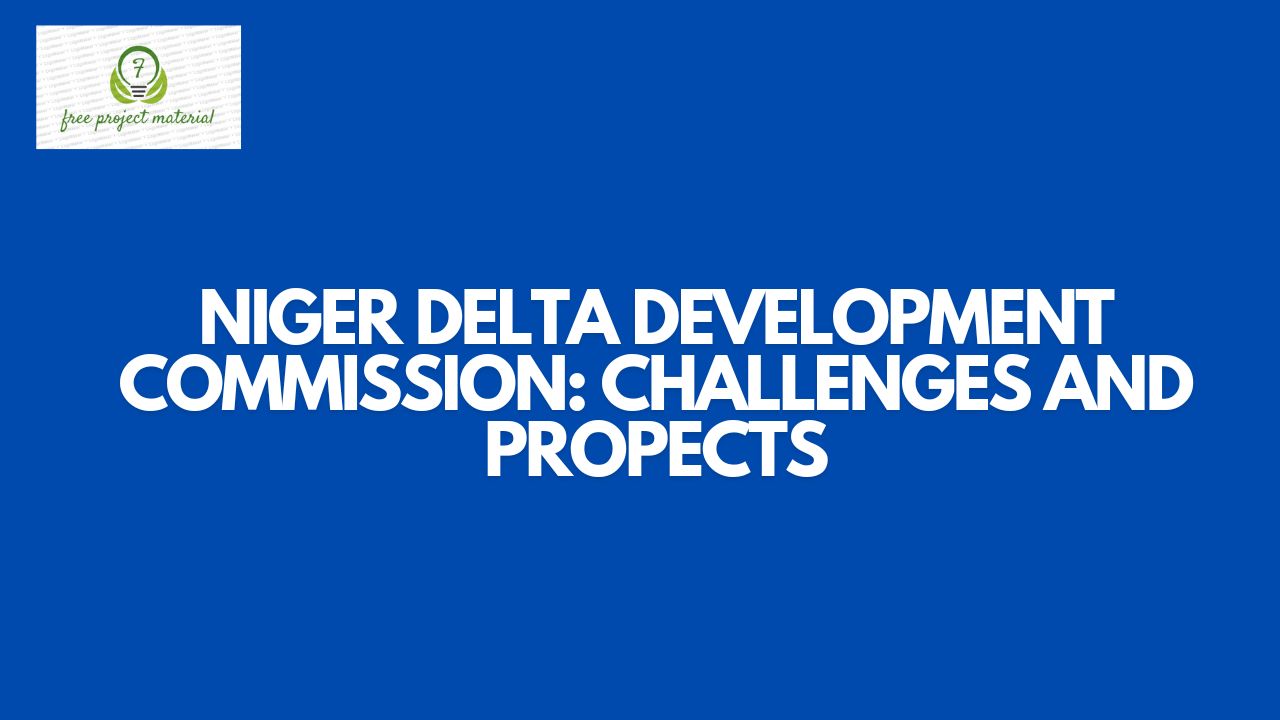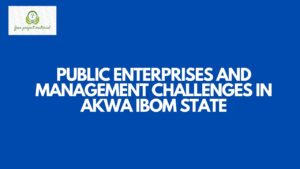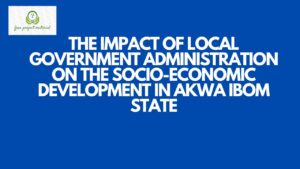ABSTRACT
This study was designed to examine the Niger Delta Development Commission: Challenges and Prospect. To accomplish the objectives of the study, the study adopted the survey research design while 120 respondents were selected as the sample size for the study. Instrument of the study was a self-developed questionnaire and the forms were personally administered. Research questions were formulated to guide the study and data were analyzed using the descriptive statistical tools which involved the use of simple percentages and frequency tables. Based on the data analysis, findings of the study revealed that; the marginalized people of Rivers State do not see the creation of the Niger Delta Commission as a solution to their problem, but rather as an attempt to extend their exploitation. Concise steps must have to be taken by the federal government and the state governments to address the long standing demand of the Niger Delta people as contained in most of its agitations
TABLE OF CONTENTS
Cover Page – – – – – – – – – i
Approval Page – – – – – – – – ii
Certification – – – – – – – – – iii
Dedication – – – – – – – – – iv
Acknowledgment – – – – – – – – v
Abstract – – – – – – – – – vi
Table of Contents – – – – – – – – vii
CHAPTER ONE
BACKGROUND OF THE STUDY
1.1 Introduction – – – – – – – – 1
1.2 Statement of the Problem – – – – – – 2
1.3 Objective of the Study – – – – – – 4
1.4 Research Questions – – – – – – 6
1.5 Significance of the Study – – – – – – 7
1.6 Scope and Limitations of the Study – – – – 8
1.6.1 Scope of the Study – – – – – – – 8
1.6.2 Limitation of the Study – – – – – – 8
1.7 Definition of Terms – – – – – – – 9
CHAPTER TWO
LITERATURE REVIEW
2.1 Introduction – – – – – – – – 11
2.2 Concept of Commission – – – – – – 11
2.3 The Odi Massacre – – – – – – – 19
2.4 Crude Oil Prospecting in Nigeria – – – – 25
2.5 Environmental Impact of Crude Oil Production in Nigeria – 27
2.6 Effect of Crude Oil Spillage – – – – – 29
2.7 Oil Production – – – – – – – 29
2.8 Theoretical Frame Work – – – – – – 30
2.9 Research Hypotheses – – – – – – 32
CHAPTER THREE
RESEARCH DESIGN/METHODOLOGY
3.1 Introduction – – – – – – – – 33
3.2 Research Design – – – – – – – 33
3.3 Population of the Study – – – – – – 33
3.4 Sample/Sampling Technique – – – – – 34
3.5 Instrumentation – – – – – – – 34
3.6 Plan for Data Analysis – – – – – – 36
3.7 Problems of Data Collection – – – – – 35
CHAPTER FOUR
DATA PRESENTATION, ANALYSIS AND INTERPRETATION
4.1 Introduction – – – – – – – – – 36
4.2 Data, Presentation Analysis and Interpretation – – – 36
4.3 Discussion of Findings – – – – – – 37
CHAPTER FIVE
SUMMARY, CONCLUSION AND RECOMMENDATIONS
5.1 Summary – – – – – – – – 43
5.2 Conclusion – – – – – – – – – 44
5.3 Recommendations – – – – – – – 45
References
Appendix
CHAPTER ONE
BACKGROUND OF THE STUDY
1.1 INTRODUCTION
Historically, the Niger Delta region was given a special development status by the then out-going colonial administration in the late 1950s. This followed agitations by the people of the area to be given a state of their own that is separate and distinct from the former Eastern Region; citing Igbo domination and hegemony as their main reason. According to Ojiako (1981) rather than recommend for the creation of a new state, the minority commission which was set up on September, 25, 1957 by the colonial secretary Sir Lennox-Boyd on the recommendation of the creation of a special area and that a federal Board be established to formulate and execute a programme of development.
Ogionwo (1997) states that the minority commission which was headed by Sir Henry Willink was admonished that “if, but only if, no other solution seemed to the commission to meet the case then as last resort to make detailed recommendation for the creation of one or more new states and in that case:
- To specify the precise area to be included in such state or states.
- To recommend the governmental and administrative structure most appropriate for it.
- To assess whether any new state recommended would be viable from an economic and administration point of view and what the effect of its creation would be on the region from which it would be created and on the federation.
It can be observed from the very beginning that the colonial authorities did not want the issue of state creation to becloud their overwhelming desire to decolonize the country and grant political independence; hence, the stiff terms of reference handed down to the commission. Ojiako (2000).
Although the commission turned down the demand for the creation of a separate River State, it was convinced that the area, even from the point of view of its physical location, had peculiar administrative and economic problems. It therefore, recommended that Brass, Degema, Ogoni and Western Ijaw divisions be designated “Special Area” Ogionwo (1979) further stressed. The Niger Delta Development Board (NDDB) was subsequently set up in October, 1964. Unfortunately, the Board achieved little or nothing throughout its fifteen years of existence, that is 1964 – 1979, in terms of actual development programmes. It is doubtful whether it ever succeeded in formulating any meaningful programmes at all beyond the commission of multiple of feasibility studies. The studies actually stressed the need to sand fill the water-logged areas of some communities and also to build bridges across minor creeks and rivulets. Ogionwo (1991).
The creation of River State in 1967 gave hope to many, but unfortunately, the Rivers State Government did its utmost to develop but was not enough, especially the difficult terrain of the place in direct comparison the meagre resources considering available resources. However, a second attempt at developing the area, which by now has become synonymous with oil exploration and exploitation was, however, made by the military regime of then President Ibrahim Babangida in 1992 when the Board of the Oil Mineral Producing Area Development Commission (OMPADEC) was inaugurated.
Meanwhile, there was growing agitation among the oil producing communities, the state, which made the Federal Government in 1991 to announce a new policy designed to give some satisfaction to the development needs and demands of these communities. According to the African Guardian Newspaper of 16 September 1991 the policy required the Nigerian National petroleum Corporation (NNPC) and its joint venture multinational oil companies to allocate 3 percent of their total capital investment to community development purposes. This policy was a departure from previous practice according to which the companies voted any amount as they deemed fit for developing specific projects in their communities of operations.
1.2 STATEMENT OF THE PROBLEM
The Niger Delta Region has always featured in several discussions on the political and economic development of Nigeria. Issues affecting this particular region bordered mainly on their marginalization in the scheme of things both politically and economically. As earlier pointed out, the people of the region, since the colonial period and following the discovery of oil in the area, have not ceased to cry out on matters affecting them. For example, they have always called for creation of new states in the area in order to further increase their chances of developing fast. Unfortunately, however, state creation and other policies that have been introduced in the area including the establishment of the Niger Delta Development Board (NDDB) and the Oil Mineral Producing Area Development Commission (OMPADEC) have not provided a permanent solution to the development problems of these oil producing communities. Hence, the youth restiveness and the destructive activities of militants that have feature prominently in these communities over the years. This unfortunate development has been a source of concern to both the federal government and Nigeria in general. This is more so as the crises the region had greatly disrupted oil production (the strength of Nigeria‟s economy) it was the attempt to find a permanent solution to the lingering crisis in the area by enhancing the development of these oil producing communities that made president Olusegun Obasanjo, on taking over the mantle of leadership in Nigeria in 1999 to establish the Nigeria Delta Development Commission (NDDC) in the year 2001.
There is no doubt the fact that government had good intentions fro setting up the commission, unfortunately, however, the activities of the Niger Delta Development Commission (NNDC) is already causing considerable controversy and debate especially among the beneficiaries (the Oil producing states). Criticism have trailed the activities of the commission in recent times. Despite the he amount of money (running into billions of naira) that the Federal Government had pumped into the commission, the crises that has ridden the oil producing communities has risen to an unprecedented dimension in recent times, thus forcing the Federal government to intervene by sending military men to the area to contain the activities of militants.
Given this skeptical scenario, it is important to critically examine the possibility of the Nigeria Delta Development Commission (NDDC) achieving it‟s a vowed purpose of promoting the development of the oil producing communities. In order to solve the basic research problem emanating from establishment f the NDDC, there are important questions that must be first raised and examined.
1.3 OBJECTIVE OF THE STUDY
The general objective of the study is to evaluate or assess the impact of the Niger Delta Development Commission (NDDC) on the development of the oil producing communities, with Rivers State as a case study. Other specific objectives of the research include:
- To assess whether the establishment of the NDDC is enough to promote development of the oil producing communities.
- To find out if the activities of the NDDC has actually enhanced the development of the oil producing communities.
- To investigate if there are other policies (apart from the establishment of the NDDC) that can solve the problems of the oil producing communities and enhance their development.
1.4 RESEARCH QUESTIONS
Fundamentally, we wish to know the relationship between the NDDC and the development of the oil producing communities. In order words, the research wishes to address these questions:
- Can the establishment of the NDDC promote the development of the oil producing communities?
- Has the activities of the NDDC actually enhanced the development of the oil producing communities?
- Are there other policies apart from the establishment of the NDDC that can solve the problem of the oil producing communities and enhance their development?
The answer to these questions will give us insight into the activities of the NDDC, to the extent to which it has been able to meet the developmental needs of Rivers State.
1.5 SIGNIFICANCE OF THE STUDY
This research work on the role of the NDDC in the development of Rivers State is significant in a number of ways:
First, the topic is one that borders on national development with economy as the chief cornerstone. Oil is Nigeria‟s major foreign exchange earner. The oil producing communities (of which Rivers State is a part) is therefore very crucial to the economic development of the country. Therefore, any assessment or concern for economic development, for example through the study at hand, cannot be seen as an exercise in academic futility.
To proffer recommendations arising from the findings of the research as to know how the preferences of the NDDC can be improved upon so that it can achieve its objectives or priorities that is, the development of the oil producing areas.
The study is also significant to the point that it is able to lay bare to the public, administrators and policy formulators, the strengths and weaknesses of the policies that government has been embarking upon (includes the establishment of NDDC) in an attempt to find lasting solution to the problems of the oil producing communities. The findings of this study may lead to modification of government policies the Niger Delta Area as well as improve the performances of the NDDC. No less significant is the importance and contribution of this study to existing literature and knowledge on the oil producing communities and the Nigeria Delta Development Commission.
Finally, the findings of this study could be of assistance to further research ad interest on how to find solutions to the problems of the oil producing communities.
1.6 SCOPE AND LIMITATIONS OF THE STUDY
1.6.1 SCOPE OF THE STUDY
The study examines the role of the Niger Delta Development Commission (NNDC) in the development of the producing communities in Nigeria. However, the oil producing communities often referred to as the Niger Delta region is relatively large covering about six states of the federation while the terrain is both difficult and unfriendly. In view of this, and as a result of the limited time and resources available for the completion of this study, the research is limited to River State, one of the major players and host to many oil exploration and servicing companies.
1.6.2 LIMITATION OF THE STUDY
As often experienced in similar studies, certain limitations were encountered in the course of this study; one of such limitations was the time factor, given the specific time frame allowed for this study, time was a problem. The researcher had to shuttle between the campus, the research environment (River State) and place of work in order to come up with an acceptable work.
1.7 DEFINITION OF TERMS
Community: The peoples who reside live and work in one locality and are subject to the same laws, have the same interest etc. a body politic.
Commission: The act of committing doing or perpetrating. The act of entrusting. A certificate which confers a particular authority. A body of person acting under public authority.
Delta: An alluvial, typically triangular-shaped, silt deposit at or in the mouth of a river. Anything triangular is delta.
Development: Gradual evolution or completion from one stage to another. To expand or bring out the potentialities, capabilities, etc, cause to come to completeness or perfection.
Oil (petroleum) Production: An oily, Liquid mixture of numeriosu hydrocarbons, chiefly of the paraffin series, found in many widely scattered subterranean deposits, and extensively used for heat and light. A number of very important substances are obtained by the fractional distillation of petroleum, such as petroleum ether, gasoline, naphtha, benzene, kerosene, paraffin etc.
Produce: To bring forth or bear; yield, as young or natural product. To bring about; causes to happen or be. The act or process of producing. That which is produced or made; any tangible result of industrial, artistic or literary labour.
River Niger: is 2,600 miles (4, 185km) long, rising on the Fouta Djallon- Plateau, South West Republic. Just below Timbuktu, Mail, the Niger begins a great bend, flowing first east and then southeast out of Mali, through the Republic of Niger and then into Nigeria. At Lokoja, central Nigera, the Benue its chief tributary, joins the Niger, which then flows south, emptying through a great delta into the Gulf of Guinea. The delta 14,000. sq miles / 36,260Km is the largest in Africa – is characterized by swamps lagoons, and navigable channels. The course of the Niger long
Puzzled Western geographers, only from 1795 to 1797 did Mungo Park, the Scottish explorer, correctly establish the eastern flow of the upper Niger, and it was not until 1830 that Richard and John Lander, English explores proved that the river empted into the gulf of guinea. The River and its tributaries drain most of the country; Nigeria has a 500 mile (80km) castile, for the – most part made up of sandy beaches, behind which lies a belt of mangrove swamps and lagoons that average 10mile (16km) in width but increases to 60 miles (95km) wide in the great Niger Delta in the East.



